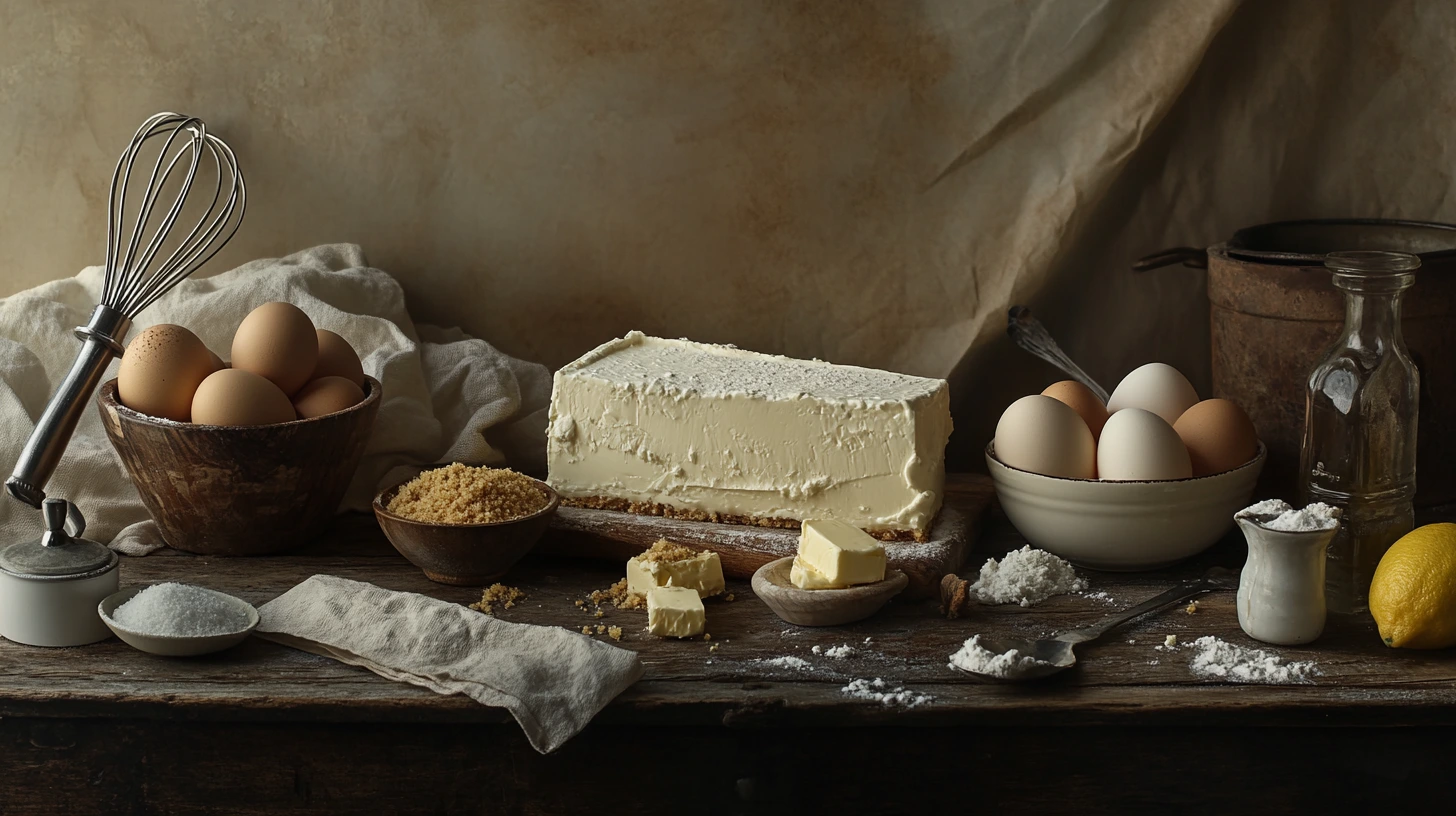Introduction: Are Cheesecakes Healthy
Cheesecake is a beloved dessert worldwide, known for its creamy texture and rich flavor. However, like most indulgent treats, its nutritional profile often comes under scrutiny. Are cheesecakes healthy? The answer isn’t straightforward, as it depends on the ingredients, portion size, and individual dietary needs. This article dives deep into the components of cheesecake, its health implications, and tips to make it a healthier choice.
Nutritional Composition : Are Cheesecakes Healthy
Primary Ingredients in Cheesecakes
Cheesecake is typically made from high-calorie and rich ingredients, contributing to its taste and texture. Let’s break down the main components and their nutritional impact.
Cream Cheese: Pros and Cons
Pros:
- It is rich in calcium, which supports bone health.
- It contains healthy fats that provide energy.
- Offers a small amount of protein.
Cons:
- High saturated fat may contribute to heart disease if consumed in excess.
- Calorie-dense, making it easy to overindulge.
Sugar Content: How Much Is Too Much?
Cheesecakes are typically sweetened with sugar, contributing to their high-calorie content.
- Standard serving: Contains 20–30 grams of sugar, exceeding the recommended daily limit for added sugars.
- Excess sugar consumption can lead to weight gain, insulin resistance, and other health issues.
Crust Ingredients: Nutritional Breakdown
The crust is usually made from crushed graham crackers, butter, and sugar, adding to the calorie and fat content.
- Graham crackers Provide some fiber but are often processed with added sugars.
- Butter: Adds saturated fat and calories.
- Sugar: Enhances flavor but increases the glycemic load.
Common Variations and Their Impact on Health
Cheesecakes come in many forms, with variations influencing their nutritional profile:
- New York-style cheesecake: Contains heavy cream and extra eggs, making it richer in calories and fat.
- No-Bake Cheesecake: Often includes whipped cream, which can reduce baking time but add sugar and processed ingredients.
- Low-fat or Vegan Cheesecake: This option uses alternatives like tofu, cashew cream, or Greek yogurt, making it a healthier option with fewer saturated fats.
Cheesecakes vs. Other Desserts: A Comparative Analysis
Calorie Comparison with Popular Desserts
Cheesecake is often considered one of the more calorie-dense desserts, but how does it compare to others? Here’s a breakdown:
- Cheesecake: A standard slice contains approximately 300–500 calories, depending on the recipe and toppings.
- Chocolate Cake: A slice averages 350–450 calories, with frosting adding significant calories.
- Apple Pie: One slice contains around 300–400 calories, primarily from the crust and sugar.
- Ice Cream Sundae: Depending on the toppings and portion size, a typical serving can range from 250 to 600 calories.
While cheesecake is on the higher end of the spectrum, portion size and added ingredients (e.g., whipped cream and fruit sauces) can heavily influence calorie counts for all desserts.
Sugar and Fat Content Analysis
Sugar Content
- Cheesecake: Contains 20–30 grams of sugar per slice, with variations depending on the recipe and toppings.
- Chocolate Cake: Averages 25–40 grams of sugar, especially with frosting.
- Apple Pie: Typically has 20–25 grams of sugar, much of it coming from added sweeteners and the fruit’s natural sugars.
- Ice Cream Sundae: Sugar content ranges from 20–50 grams, depending on the syrup, candy, or whipped cream added.
Fat Content
- Cheesecake: High in fat due to cream cheese and butter, with 18–30 grams per slice, about half of which is saturated fat.
- Chocolate Cake: Contains 15–25 grams of fat, mostly from butter and cocoa.
- Apple Pie: Has 12–18 grams of fat, primarily from the crust.
- Ice Cream Sundae: The fat content ranges from 10 to 25 grams, influenced by the type of ice cream and toppings.
Health Benefits of Cheesecakes: Are cheesecakes healthy?
Nutrient Contributions from Dairy Ingredients
Cheesecake’s primary ingredient, cream cheese, is a dairy product that provides some essential nutrients:
- Calcium: Supports bone health, muscle function, and nerve signaling. A slice of cheesecake can contribute to your daily calcium needs.
- Protein: Though not a high-protein food, cheesecake contains a moderate amount of cream cheese, milk, or yogurt. Protein helps with muscle repair and satiety.
- Vitamin A: Found in cream cheese and butter, this vitamin supports vision, immune function, and skin health.
When made with ingredients like Greek yogurt or reduced-fat dairy, cheesecake can offer additional nutritional benefits, with less fat and more protein.
Benefits of Ingredients like Eggs and Nuts: Are cheesecakes healthy ?
Eggs
- Rich in high-quality protein, eggs contribute to muscle building and repair.
- It contains essential vitamins like vitamin D, B12, and choline, which support brain function and energy metabolism.
Nuts
- Often used in crusts or as toppings, nuts like almonds, walnuts, or pecans provide:
- Healthy fats: Beneficial for heart health and reducing inflammation.
- Fiber: Helps improve digestion and maintain blood sugar levels.
- Micronutrients: Nuts are a good source of magnesium, vitamin E, and antioxidants.
Potential Health Risks of Cheesecakes
High Caloric Density and Weight Gain Risks
Cheesecakes are calorie-dense due to their rich ingredients, including cream cheese, butter, and sugar.
- Average calorie content: A single slice contains 300–500 calories, which can quickly add up if consumed frequently or in large portions.
- Weight gain risks: Regular overconsumption of high-calorie desserts like cheesecake may lead to weight gain, especially without balanced physical activity.
Effects of Excess Sugar on the Body
Cheesecake often contains significant amounts of added sugar, which can have adverse effects when consumed in excess:
- Blood sugar spikes: High sugar intake can cause rapid increases in blood glucose levels, leading to energy crashes and insulin resistance over time.
- Increased risk of chronic diseases: Diets high in sugar are associated with obesity, type 2 diabetes, and heart disease.
- Dental health issues: Sugary desserts contribute to tooth decay and cavities.
Understanding Saturated Fat Levels
Cheesecake is high in saturated fat, primarily from cream cheese and butter:
- Health concerns: Excessive saturated fat intake is linked to increased LDL (bad cholesterol) levels, which may raise the risk of heart disease.
- Recommended limits: The American Heart Association recommends keeping saturated fat intake to less than 10% of total daily calories. One slice of cheesecake can account for a significant portion of this limit.
Can Cheesecakes Be Made Healthier?
Ingredient Substitutions for a Healthier Cheesecake
Low-Fat Cream Cheese Alternatives
Replacing regular cream cheese with lower-fat alternatives can significantly reduce the calorie and fat content of your cheesecake:
- Neufchâtel cheese offers a similar texture and taste but with less fat.
- Greek yogurt: Adds creaminess while boosting protein content and lowering fat.
- Cottage cheese: Blended cottage cheese can mimic the smooth texture of cream cheese with fewer calories.
Natural Sweeteners Over Processed Sugar
Switching to natural sweeteners can provide sweetness with additional nutrients and fewer calories:
- Honey: A natural option with antioxidants and trace minerals.
- Maple syrup: Adds a unique flavor and contains small amounts of vitamins and minerals.
- Stevia or erythritol: Calorie-free sweeteners that can reduce sugar content without compromising sweetness.
Whole-grain crusts for Added Fiber
Instead of traditional graham cracker crusts, opt for healthier, fiber-rich alternatives:
- Oats: Combine oats with a small amount of honey and coconut oil for a nutritious crust.
- Whole-grain crackers: Use whole-grain or bran-based crackers as a base.
- Nuts and seeds: Ground nuts or seeds mixed with natural sweetener can create a crunchy, nutrient-dense crust.
Portion Control and Serving Suggestions
Even a healthier cheesecake should be enjoyed in moderation. Here are some tips:
- Smaller slices: Serve cheesecake in thinner slices to reduce calorie intake while enjoying the treat.
- Mini cheesecakes: Make individual portions in muffin tins to control serving sizes.
- Pair with fresh fruit: Serve cheesecake with fresh berries or fruit slices for added nutrients and natural sweetness, making it more satisfying.
Cheesecakes in Special Diets
Gluten-Free Cheesecakes
Gluten-free cheesecakes are ideal for individuals with gluten sensitivities or celiac disease.
- Crust alternatives: Replace traditional graham crackers with:
- Gluten-free cookies: Easily found in stores and work as a direct substitute.
- Nuts and seeds: A mix of crushed almonds, pecans, or sunflower seeds combined with a binder like coconut oil or honey.
- Thickening agents: Ensure any added thickeners or stabilizers, like cornstarch or xanthan gum, are gluten-free.
Keto-Friendly Cheesecakes
Keto cheesecakes are tailored for low-carb, high-fat diets, allowing dessert without breaking ketosis.
- Crust: Use almond flour or crushed pecans mixed with melted butter and a keto-friendly sweetener.
- Sweeteners: Replace sugar with erythritol, monk fruit, or stevia for sweetness without carbs.
- Dairy options: Stick with full-fat, heavy, and sour cream cheese to maintain the high-fat profile.
- Toppings: Avoid low-carb options like unsweetened cocoa powder, nuts, or fresh berries in moderation.
Vegan Cheesecake Options
Vegan cheesecakes eliminate all animal products while maintaining a creamy texture and delicious flavor.
- Base: Use soaked cashews blended with coconut cream, silken tofu, or almond cream for the filling.
- Sweeteners: Maple syrup, agave nectar, or dates work as natural sweeteners.
- Crust: Combine nuts, seeds, and dates for a simple, raw crust.
- Thickening agents: Use agar-agar, cornstarch, or coconut oil to help set the cheesecake.
- Toppings: Fresh fruits, fruit compotes, or vegan chocolate add a finishing touch.
FAQs: Are Cheesecakes Healthy
Are cheesecakes better than ice cream for health?
It depends on the serving size and ingredients.
- Cheesecake: Higher calories and fat due to cream cheese and crust, but it also offers nutrients like calcium and protein.
- Ice cream is typically lower in calories per serving but may contain more sugar.
- Both can fit into a balanced diet in moderation, but cheesecake tends to be more calorie-dense.
How many calories are in a slice of cheesecake?
The calorie content of a slice of cheesecake depends on its size and ingredients:
- Classic cheesecake: 300–500 calories per slice.
- Low-fat versions: 200–300 calories per slice.
- Specialty cheesecakes (e.g., chocolate, caramel): Can exceed 600 calories per slice.
Can people with diabetes eat cheesecake?
Yes, but with modifications and portion control:
- Use sugar substitutes like stevia or erythritol.
- Reduce or eliminate the crust, or use a low-carb, high-fiber crust alternative.
- Pair with protein or fiber-rich foods to balance blood sugar levels.
- It’s best to consult a healthcare professional before including cheesecake in a diabetic diet.
Is homemade cheesecake healthier than store-bought?
Generally, yes, because homemade cheesecake allows for control over ingredients:
- You can use natural sweeteners, low-fat dairy, or whole-grain crusts.
- Avoid preservatives, artificial flavors, and excess sugar, often in store-bought versions.
How often should cheesecake be eaten?
Cheesecake is best enjoyed as an occasional treat due to its high calorie, sugar, and fat content.
- Consider limiting consumption to once or twice a month, depending on your dietary goals.
- Practice portion control and balance it with a healthy diet overall.
Cheesecake can be a delicious part of life when enjoyed mindfully and in moderation!
Conclusion: Are cheesecakes healthy
Cheesecake is a beloved dessert with a rich flavor and creamy texture that has earned its place on dining tables worldwide. While it offers certain health benefits, such as calcium, protein, and nutrients from eggs or nuts, its high calorie, sugar, and saturated fat content makes moderation key. Cheesecake can be enjoyed as part of a balanced lifestyle by understanding its nutritional profile, experimenting with healthier ingredient substitutions, and practicing portion control.
For those with special dietary needs, gluten-free, keto-friendly, and vegan cheesecakes ensure everyone can indulge in this classic treat. Whether homemade or store-bought, the key to enjoying cheesecake is making informed choices and savoring it responsibly.
Are cheesecakes healthy?
For more inspiration:
“Healthy cheesecake recipe” linking to https://biscsweet.com/healthy-cheesecake-recipe/
“Mini cheesecake recipe” linking to https://biscsweet.com/mini-cheesecake-recipe/
“Difference between New York cheesecake and classic cheesecake” linking to https://biscsweet.com/what-is-the-difference-between-new-york-cheesecake-and-classic-cheesecake/
“Is it cheaper to make cheesecake or buy it?” linking to https://biscsweet.com/is-it-cheaper-to-make-cheesecake-or-buy-it/
“Why add whipping cream to cheesecake” linking to https://biscsweet.com/why-add-whipping-cream-to-cheesecake/



